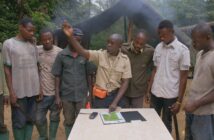Many of us have likely visited a zoo as a young person or with children, and for most this experience is the first time we encounter many animals from across the world. These establishments range in their care and housing of their residents; while some are not so great, others excel and often give back in profound ways to conservation efforts. More often than not, caretakers are devoted and passionate about the well-being of the captive animals, providing the best possible environments and support for these beings. What we may not think about on these excursions however, is how much care these animals require, and further, how exactly their psychological and physical needs are being met. For one woman, this is THE question she asks herself everyday. That woman is Hilda Tresz.
In the recent documentary about Hilda’s work, A Week to Change (directed by Chloe Rossman), we’re introduced to the world of a woman who tries to get inside the mind – comforts, stimulations, struggles, and joys – of captive animals, in order to better their lives. Through a partnership initiated in 2012 with the Jane Goodall Institute, Hilda began her work with the Phoenix Zoo to promote international captive animal welfare. Her role, with the official title of International Animal Welfare Coordinator, may seem vague but is only because, as you see in the film, it requires a macgyver-esque ability to deal with as many animal related situations as you can imagine.
From using cardboard boxes and hay, to maybe even an old car tire, Hilda builds enclosures that create a specific sense of home for every sort of creature – especially when it comes to the undertaking of more complex animal care, as is the case for chimpanzees. Her work, which takes her around the globe, also encourages zoo keepers to challenge animals through unique games (which can also be created using readily available and cheap materials), in some ways replicating the natural puzzle solving or overall stimulation necessary for these creatures to survive in the wild, and remain cognitively engaged. The ultimate hurdle for Hilda in her work is a combination of lack of keeper training concerning the idea of holistic animal welfare, and existing enclosures that were created without true knowledge of the needs of various animals to begin with. To these problems, Hilda brings solutions and patience, improving keeper-animal relationships, animal well-being, and in many cases the relationships between animal groups.
Watch the Film:
In the film, we are given a glimpse into the life of Hilda who acts as a sort of CSI (Crime Scene Investigator) of animal welfare in her attention to detail and ability to come into completely new and different situations with an understanding of the entire dynamic system. Two of Hilda’s many rotating projects are highlighted in the film – one in Rostov Zoo in Russia and another in Shanghai Wild Animal Park in China. With only “a week to change,” Hilda must assess the current conditions of the animals in order to develop strategies and trainings to better the situation, usually with very limited resources. In every case, she works closely with keepers, leaving an imprint of growth of awareness and knowledge.
The difference made with sometimes only minor tweaks, is startling. In Russia, Hilda simply (though the process is not necessarily simple) suggests that two unrelated lemurs, separated in large enclosures, be brought together into one. This creates a marked change in the behavior of both lemurs, who as social primates require bonding with others of their species. In China, Hilda works on a much more complicated case to create a large family group of unrelated chimpanzees. The results are even more striking than those in Russia. The chimpanzees, a species which we know to be extremely dependent – like humans – on social interactions and hierarchies (Learn more here), forge a group of dynamic relationships in the process and are able to develop their own sense of identity within this new larger “family.” In all these instances and more presented in the film, it is obvious that this thorough and thoughtful work to improve the lives of captive animals, is vital.
Dr. Jane Goodall, interviewed for the film, reflects:
What Hilda is doing is absolutely fantastic, because I’ve had so much experience of seeing chimps in terrible conditions…it’s always been something very important to me.
Read more about Hilda’s work here.

The Jane Goodall Institute is a global community conservation organization that advances the vision and work of Dr. Jane Goodall. By protecting chimpanzees and inspiring people to conserve the natural world we all share, we improve the lives of people, animals and the environment. Everything is connected—everyone can make a difference.








